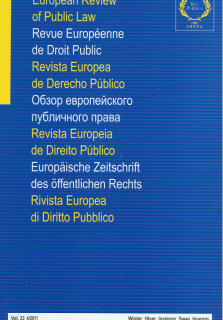
Administrative Law / Droit administratif
Serbia / Serbie
Aleksandra Čavoški
Professor of Law at the Union University Belgrade School of Law,
Visiting Professor of Law at the Washington and Lee University, School of Law
(August 2011-January 2011)
The year 2011 will certainly be remembered for the activism of the Serbian Government and Serbian public administration, which was prompted by the European Commission's announcement of releasing an Opinion on the Serbian application for membership to the European Union and involved an extensive but hasty administrative and legal reform. Even though the Opinion published in October 2011 underlines the positive achievements in relation to all Copenhagen criteria, careful reading of the analytical report demonstrates that certain perennial problems in the field of administrative law and policy still remain a major challenge. Moreover, these difficulties were reiterated in all previous annual Commission's reports. This demonstrates the need to resolve those problems in a more systematic and strategic manner. Thus, the author analyses some of the critical remarks made in the Commission's reports in order to identify the main deficiencies regarding public administration. They mostly refer to the lack of adequate administrative capacities both in terms of the number of staff and in terms of their expertise; inadequate vertical and horizontal coordination between the public administration bodies; the requirement for a more de-politicised, professionalised and more rational public administration and the need for improved legal drafting by the ministries. Experiences of several new members of the European Union, notably Slovenia and Romania, are considered since they represent an important reference point for Serbia. The author also examines the positive results of the Serbian public administration reform, especially those achieved in 2011. Finally, the reasons for persistent problems relating to the public administration are also analysed in the chronicle in order to identify reasons for the slow pace of reform.
L'année 2011 restera certainement dans les mémoires pour l'activisme du gouvernement et de l'Administration publique serbes déclenché par l'annonce de la Commission européenne concernant la publication d'un avis sur la demande serbe d'adhésion à l'Union européenne, ce qui a entraîné une réforme administrative et juridique étendue mais précipitée. Même si l'avis publié en octobre 2011 souligne les gains obtenus par rapport à tous les critères de Copenhague, une lecture attentive du rapport analytique montre que certains problèmes vivaces dans le domaine du droit administratif et de la politique administrative restent un défi majeur. De plus, ces difficultés avaient déjà été signalées dans tous les rapports annuels de la Commission. Cela prouve qu'il est nécessaire de résoudre ces problèmes d'une manière plus systématique et stratégique. Par conséquent, l'auteur analyse certaines des observations critiques formulées dans les rapports de la Commission afin d'identifier les principales insuffisances concernant l'Administration publique. Elles concernent essentiellement le manque de moyens administratifs adéquats en termes d'effectifs aussi bien que de compétence des effectifs; la coordination verticale et horizontale inadéquate entre les différents corps de l'Administration publique; le besoin d'une Administration publique plus dépolitisée, professionnelle et rationnelle et la nécessité d'une meilleure rédaction des textes juridiques par les ministères. Les expériences de certains nouveaux membres de l'Union européenne, comme la Slovénie et la Roumanie, sont examinées parce qu'elles sont un point de référence important pour la Serbie. L'auteur examine également les résultats positifs de la réforme de l'Administration publique serbe, notamment ceux acquis en 2011. Enfin, les raisons de problèmes persistants concernant l'Administration publique sont aussi analysées dans cette chronique afin d'identifier les raisons de la lenteur de la réforme.





















